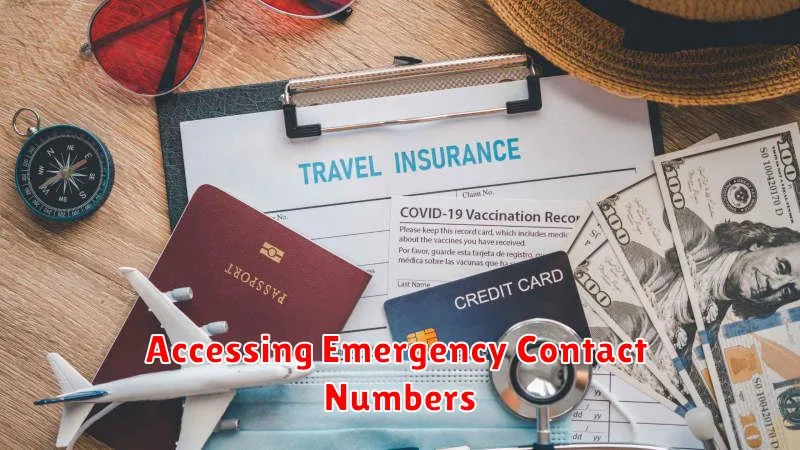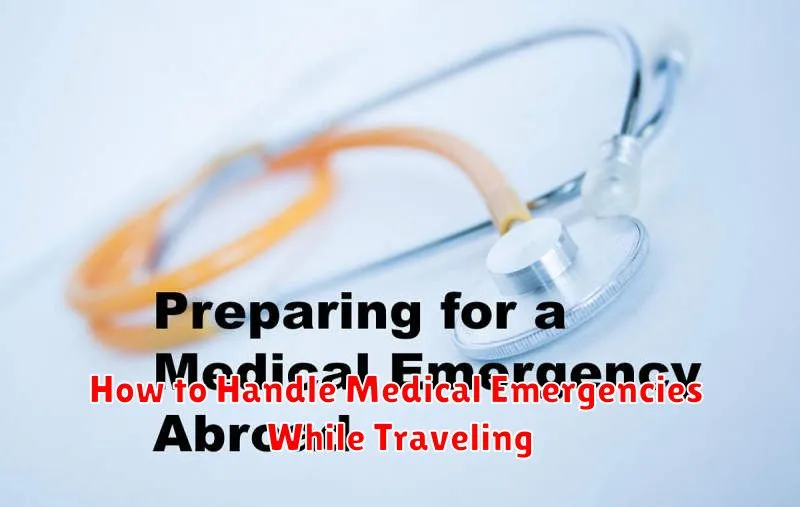Traveling can be an enriching experience, but it’s crucial to be prepared for unexpected events, especially medical emergencies. Whether you’re embarking on a domestic trip or venturing abroad, understanding how to handle medical emergencies while traveling can significantly impact your health and safety. This article provides essential guidance on managing medical emergencies effectively while away from home, offering practical tips and crucial information to ensure a safe and healthy journey.
From minor ailments to serious medical emergencies, being prepared is key. This guide addresses various scenarios, from dealing with common travel illnesses like food poisoning to navigating more severe situations requiring immediate medical attention. Learn how to assess the situation, access local medical resources, utilize travel insurance, and communicate effectively in a medical emergency. Being equipped with the right knowledge and strategies can make all the difference in ensuring a positive outcome during a medical emergency while traveling.
What Counts as a Medical Emergency?
A medical emergency is a situation requiring immediate medical attention due to a serious illness or injury. Recognizing these situations is crucial, especially while traveling.
Examples include difficulty breathing, chest pain, severe bleeding, loss of consciousness, sudden confusion, stroke symptoms (facial drooping, arm weakness, speech difficulty), and serious injuries from falls or accidents.
Finding Nearby Hospitals or Clinics
In a medical emergency, swift access to care is crucial. Locate the nearest hospitals or clinics using these methods:
Smartphone Apps: Many map and travel apps can pinpoint nearby medical facilities. Ensure your location services are enabled.
Local Inquiry: Ask hotel staff, locals, or nearby businesses for directions to the closest medical center.
Emergency Services: If the situation is life-threatening, contacting emergency services is paramount. They can dispatch an ambulance and guide you.
Using Your Travel Insurance Properly
Travel insurance is crucial for handling medical emergencies abroad. Immediately contact your insurance provider if you experience a medical issue requiring treatment. Provide them with all necessary details, including your policy number, location, and the nature of the emergency.
Keep all documentation related to your medical care, such as receipts, medical reports, and prescriptions. This documentation is essential for filing a claim and receiving reimbursement.
Familiarize yourself with your policy’s coverage limits and exclusions before your trip. Understand what procedures and expenses are covered and what your out-of-pocket expenses might be.
Accessing Emergency Contact Numbers

Knowing how to quickly access emergency numbers is crucial during a medical crisis abroad. Pre-program essential contacts into your phone. This includes local emergency services, your country’s embassy or consulate, and your personal physician.
Consider creating a physical list as a backup. Store it separately from your phone in case of loss or damage. Ensure it contains important numbers like your insurance provider’s emergency contact as well.
Language Barriers in Medical Situations
One of the most significant challenges during a medical emergency abroad is the language barrier. Inability to communicate effectively with medical professionals can hinder diagnosis and treatment.
Key strategies for overcoming this obstacle include:
- Learning basic medical phrases in the local language.
- Utilizing translation apps or pocket dictionaries.
- Carrying a medical alert card with pre-translated information about your medical conditions and allergies.
Having a prepared plan can greatly improve your ability to receive appropriate care in an emergency.
How to Carry Medical Records Safely
Carrying medical records is crucial for effective emergency care while traveling. Digitize your records by scanning or photographing them. Save these files to a secure, password-protected location like a cloud service or encrypted USB drive.
Consider carrying a concise printed summary of essential information, such as allergies, medications, medical conditions, and emergency contact details. Keep this document separate from your main luggage, ideally in your carry-on bag.
Staying Calm and Informed
In a medical emergency, staying calm is crucial for clear thinking and effective decision-making. Take deep breaths and try to assess the situation rationally.
Gather information about the individual’s condition. What are their symptoms? Do they have any known medical conditions or allergies? This information will be vital when seeking medical assistance.
If possible, locate important documents such as their passport, insurance information, and any medical alert bracelets or cards they may have.

